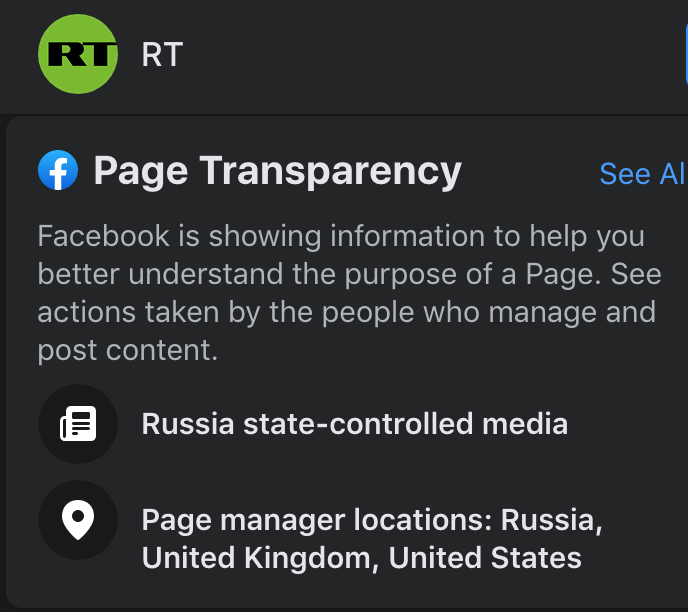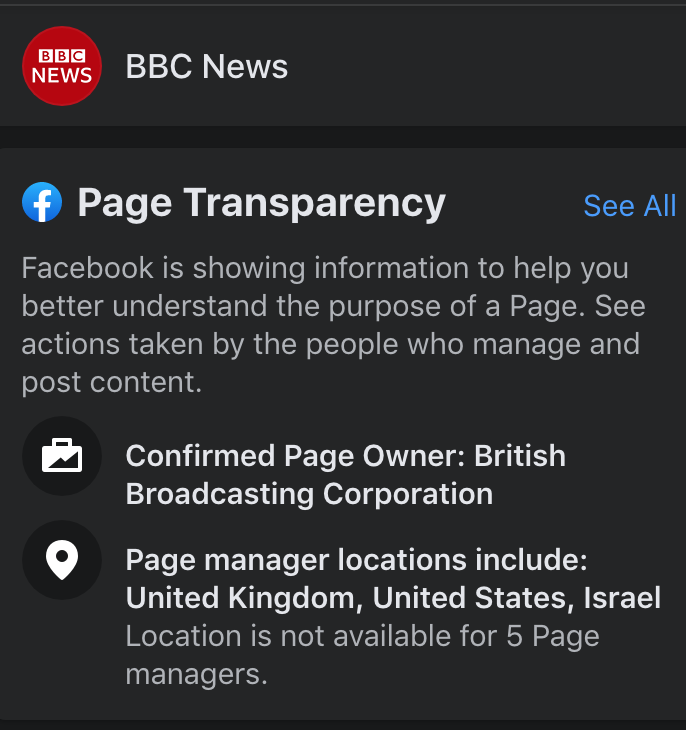Facebook selectively slaps ‘state-controlled media’ warning on some government-funded outlets ahead of 2020 US elections
Facebook is labeling content posted by state-funded media outlets and plans to bar them from running ads in a conveniently loophole-packed effort to prevent “foreign influence” in the 2020 US presidential election.
Pages of Russian and Chinese media outlets have already been graced with the new warning labels, which Facebook announced on Thursday in a blog post.
The social media behemoth claimed it is taking other factors into account besides government ownership, explaining “if we determine that there are enough protections in place to ensure editorial independence, we will not apply the label.”
Also on rt.com Zuckerberg won’t censor Trump, but don’t mistake Facebook for a bastion of free speechPublishers wishing to avoid the labels must demonstrate a certain degree of legally-protected editorial autonomy from their host country/owner, Facebook explained in the post.
In addition to some kind of “statute in the host country that clearly protects the editorial independence” of the outlet and “established procedures, processes, and protections at the media organization to ensure editorial independence,” the publisher must undergo “an assessment by an independent, credible external organization” to verify “that the statute has in fact been complied with and established procedures have been followed.”
The platform revealed it will also consider “country-specific factors, including press freedom” - whatever that entails - and “open-source research conducted by academics and leading experts.”
The post doesn’t mention the names of any such organizations or experts, but given Facebook’s deep bench of ideologically-motivated “fact-checkers,” some state-run media outlets are unlikely to catch a break if they hope to be impartially evaluated. That's even before factoring in the platform's long-standing "election integrity" partnership with the Atlantic Council, a pro-war think tank which along with other groups deplatformed hundreds of accounts that dared challenge neoliberal centrist political orthodoxy.
Elsewhere in the post, Facebook touts the assistance of 65 unnamed “experts” in “media, governance, and human rights and development” in helping the platform devise its criteria, acknowledging that government control of a media organization doesn’t end at ownership or direct funding.
“Mission statement, mandate, and/or public reporting” on an outlet’s “journalistic mission,” ownership structure, “editorial guidelines” including “transparency around sources” and “independence and diversity of sources,” funding and income sources, staffing information, and accountability policies were also taken into account, Facebook explained.

Russia-backed RT, Sputnik, and Redfish and China’s Xinhua News and CCTV are already sporting the warning notices on their pages under the heading “Page Transparency,” while news outlets controlled by US allies, like the BBC, carry noticeably softer language - a similar double standard to that in evidence on YouTube, which has carried warning notices for years.

RT called out the hypocrisy of the social media giant in a statement on Thursday, saying that “a US company long in bed with the US establishment, telling the entire rest of the world what it can and cannot say, is the definition of a technological dictatorship and censorship.”
Labeling foreign editorially independent news outlets as anything but is, on top of fostering prejudice and xenophobia, a prime example of the very ‘fake news’ that Facebook is supposedly trying to combat.
Facebook will also label ads from state-backed publishers starting later this year, the platform announced, adding that while such outlets “rarely advertise in the US,” it plans to block their ads in the country anyway “out of an abundance of caution to provide an extra layer of protection against various types of foreign influence in the public debate” surrounding November’s elections.
The social network seems to be pulling out all the stops to avoid a repeat of the 2016 election, in which it was fingered as one of the culprits for President Donald Trump’s victory. The platform was dragged for allowing Cambridge Analytica to slurp up private information on tens of millions of unsuspecting users on behalf of the Trump campaign, allegedly giving the campaign an advantage Hillary Clinton did not enjoy. CEO Mark Zuckerberg spent hours deflecting questions from members of Congress as he apologized and double-talked his way out from under privacy scandal after privacy scandal, promising to do better “next time” and impose tighter controls on content.
Also on rt.com DOJ drops charges against ‘Russian trolls’ after they dared demand evidence in US courtThe platform was also slammed for allegedly permitting the so-called St. Petersburg-based "troll farm" Internet Research Agency to purchase $100,000 worth of ads. While the sum was literally a drop in the bucket next to the billions of dollars spent by the campaigns, and many of the ads neither related to the candidates nor were seen until after Election Day, Russiagate special counsel Robert Mueller nevertheless made a big show of prosecuting 13 employees of the company for alleged “information warfare against the United States,” safe - or so he thought - in the knowledge that the alleged troll-farmers were unlikely to respond to the charges in court. When their co-defendants did exactly that, Mueller was finally forced to sheepishly dismiss the charges earlier this year.
Facebook has been on a censoring spree ever since, clamping down on users who deviate too far from the business-friendly mainstream line - whether they fall on the left or right side of the political spectrum. However, Zuckerberg landed in hot water earlier this week when he refused to censor a post by Trump threatening to sic the National Guard on looters in Minneapolis. Employees vowed to change his mind by any means necessary, while nearly three dozen early Facebook employees no longer at the company excoriated their former boss for what they termed a “cowardly...betrayal” of the company’s ideals.
The usual suspects came out of the woodwork to cheer for Facebook’s decision to further censor political wrongthink.
Thank you @facebook!! We've been lobbying for this for literally years. It is LONG overdue.State media should be defined in terms of state control, including over personnel appointments, & the presence of covert message-coordination mechanisms like temniki & United Front Work.
— PropOrNot ID Service 🇺🇸 (@propornot) June 4, 2020
I personally believe this is an important step forward. Each platform has taken some steps toward a policy on state media. More transparency around where messages are coming from is important. Particularly as sensational stories go viral so quickly.
— Renee DiResta (@noUpside) June 4, 2020
Some even demanded more censorship.
Face Book should stop scraping around the edges.
— Rabbit (@exrabb) June 4, 2020
Far from anything that's enough! Do much better @Facebook if you want to come back from being lost in the bowels of Russia's GRU Kremlin sewer.
— Vote Blue Save America (@lisaiceland) June 4, 2020
But not everyone was thrilled.
This is actual McCarthyism
— Centrism Fan Acct 🔹 (@Wilson__Valdez) June 4, 2020
Unfortunately, the $FB policy goes on to exempt US state media which has a history of illegally propagandizing Americans via Facebook ads as my research shows > https://t.co/wODbCe5meh
— Jennifer Grygiel (@jmgrygiel) June 4, 2020
Think your friends would be interested? Share this story!













